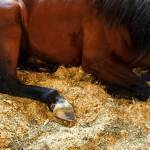Colitis in Horses: Testing for Cause of Diarrhea

Because it causes diarrhea and rapid debilitation in horses, inflammation of the intestinal lining, also called colitis, can go from messy to disastrous in the blink of an eye. Despite the fact that many colitis cases are treated similarly, knowing the underlying cause of colitis will provide valuable information on the possible course of the disease. Will horses recover uneventfully, or will they develop life-threatening laminitis?
Diarrhea can develop secondary to infection with certain pathogens or any condition that alters the intestinal microbiome.
“Disruption of the microbiome in horses is often associated with increases in lactic acid-producing and -utilizing bacteria and decreases in fiber-fermenting bacteria,” explained Catherine Whitehouse, M.S., a nutrition advisor for Kentucky Equine Research.
These alterations in the microbiome frequently result in poor feed utilization and other negative effects on the overall health of the horse. Increased production in lactic acid, for example, can cause subclinical acidosis of the hindgut.
“Stabilizing the microbiome is important in managing horses, and this is typically done by keeping horses on a familiar diet. Changes in substrate availability in the hindgut towards rapidly fermentable carbohydrates and proliferation of pathogenic bacteria can both produce a more acidic environment,” Whitehouse said. “These acidic pH levels need to be neutralized for the fiber-digesting bacteria to survive and thrive. Digestive buffers such as EquiShure are designed to neutralize acid and maintain a more optimal hindgut environment.”
When faced with a diarrheic horse, distinguishing between infectious and noninfectious causes of diarrhea can be extremely difficult. Common infectious causes of diarrhea include Salmonella enterica, Clostridium spp., equine coronavirus (an emerging disease), and Neoricksettsia risticii, the agent responsible for Potomac Horse Fever.
The importance of testing for these infectious causes of colitis was recently highlighted in a study that reviewed medical records from 85 horses presenting with diarrhea.* Twenty-six were diagnosed with Potomac Horse Fever, 16 with coronavirus, 20 with salmonellosis, and 23 with an unidentified cause.
None of the horses diagnosed with coronavirus died and none developed laminitis, a common sequela of colitis. In contrast, only 65% of the horses with Potomac Horse Fever survived to discharge from hospital, and 42% developed laminitis. For salmonellosis, 70% of the horses survived to discharge, and only 15% developed laminitis.
Overall, 20% of the horses included in the study with diarrhea, regardless of cause, ultimately developed laminitis. Of the 22 nonsurvivors, 13 of those had laminitis (59%).
In sum, horses with Potomac Horse Fever had lower survival rates and higher risks of developing laminitis than other infectious causes of colitis. These data show that testing horses with diarrhea for common infectious causes gives owners important information about their horse’s risk of laminitis and survival.
“Returning the intestinal microbiome back to its healthy baseline state as quickly as possible in these horses may minimize the chances of laminitis and maximize survival. Digestive buffers and probiotics such as Saccharomyces boulardii may benefit diarrheic horses during treatment and during recovery by restoring the diversity and robustness of the microbiome,” suggested Whitehouse.
Always seek veterinary care as soon as possible in the face of colitis. The consequences of diarrhea can be devastating if the condition is not treated promptly.
*Luethy, D., R. Feldman, D. Stefanovski, and M.R. Aitken. 2021. Risk factors for laminitis and nonsurvival in acute colitis: Retrospective study of 85 hospitalized horses (2011-2019). Journal of Veterinary Internal Medicine:10.111/jvim.16147.








